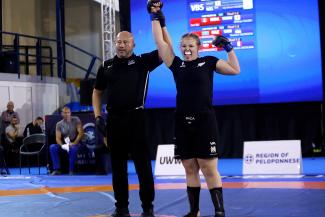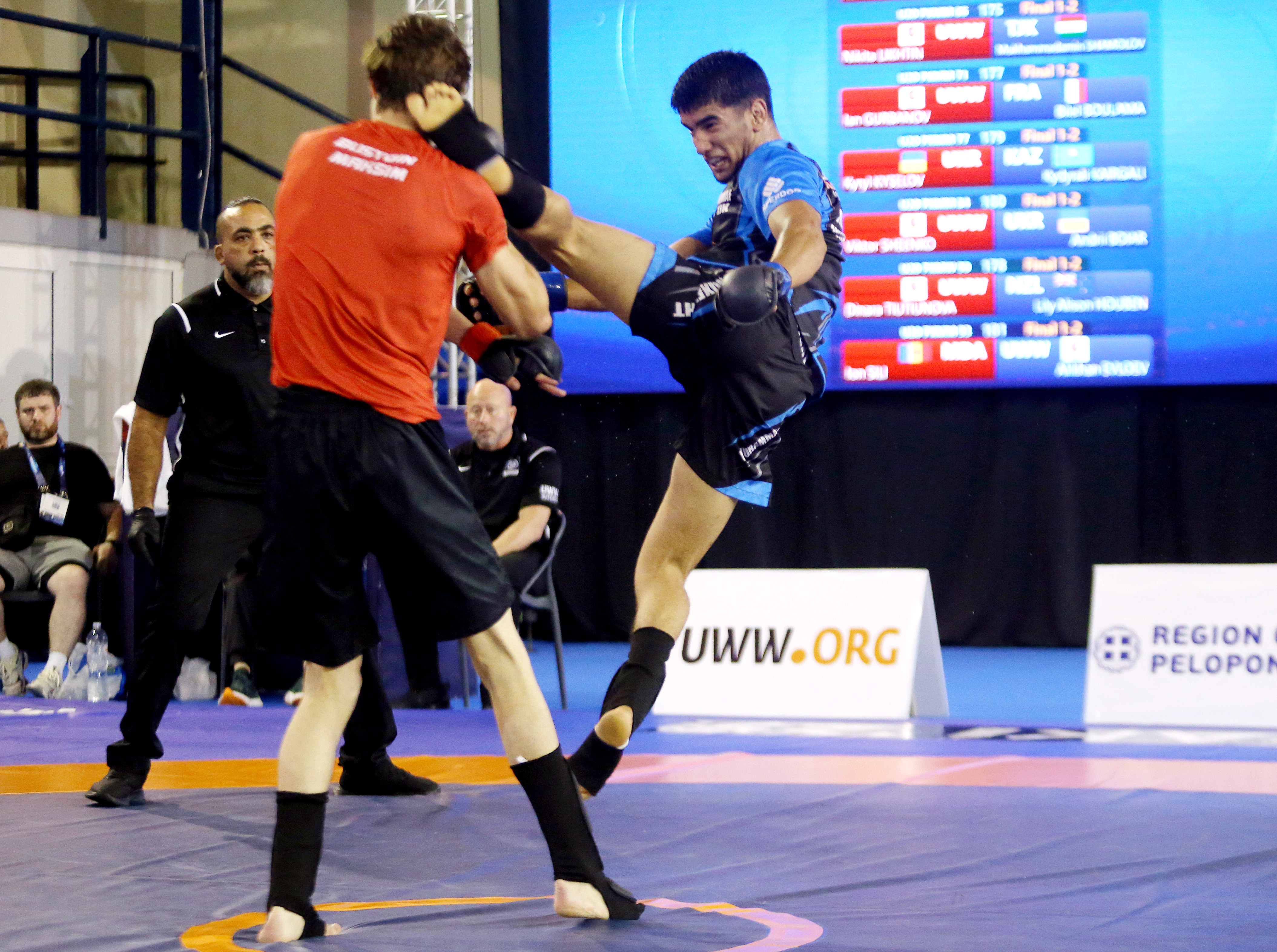UWW 25-Under-25: No. 6-No. 10
Thursday, February 17, 2022 - 06:24 By Eric Olanowski

CORSIER-SUR-VEVEY, Switzerland (February 17) -- United World Wrestling looked at 25 wrestlers who will undoubtedly keep wrestling fans at the edge of their seats throughout '22 and beyond.
With three short years left until the Paris Games, we're redirecting our attention to the sport's brightest young stars who are entering the prime of their careers. It's time to whisk in the next generation of talent that'll shoulder the weight of the sport into the '24 Olympics and beyond.
The question you asked, and we answered: "Who are the Top 25 Under 25?"
Here's UWW's fourth segment -- No. 10 through No. 6 -- of the Top 25 Under 25 to keep an eye on.
UWW 25-Under-25: No. 21-No. 25
No. 25 - Alina AKOBIYA (UKR), 23-years-old
No. 24 - Osman NURMAGOMEDOV (AZE), 24-years-old
No. 23 - Artur SARGSYAN (RWF), 24-years-old
No. 22 - TUMUR OCHIR Tulga (MGL), 24-year-old
No. 21 - Arsen HARUTYUNYAN (ARM), 22-years-old
UWW 25-Under-25: No. 20-No. 16
No. 20 - Anshu MALIK (IND), 20-years-old
No. 19 - Irinia RINGACI (MDA), 21-years-old
No. 18 - Zagir SHAKHIEV (RUS), 23-years-old
No. 17 - Aiperi MEDET KYZY (KGZ), 23-years-old
No. 16 - Leri ABULADZE (GEO), 23-years-old
UWW 25-Under-25: No. 15-No. 11
No. 15 - Ernazar AKMATLIEV (KGZ), 23-years-old
No. 14 - Amin MIRZAZADEH (IRI), 24-years-old
No. 13 - Akari FUJINAMI (JPN), 18-years-old
No. 12 - Abasgadzhi MAGOMEDOV (RWF), 23-years-old
No. 11 - Koumba LARROQUE (FRA), 23-years-old
No. 10 Iryna KOLIADENKO (UKR), 23-years-old (August 28, 1998)
Instagram: koliadenko__8
Over the last few years, Ukraine’s women’s wrestling squad has been on a rapid rise to the top of the ranks and Koliadenko is one of the main reasons.
Koliadenko made her senior-level debut at the non-Olympic weight of 65kg in 2017 while still being junior and U23 eligible. She failed to finish on the podium at her first three events but medaled at seven of her last eight competitions.
Koliadenko’s rise began at the 2019 International Ukrainian Tournament where she defeated Individual World Cup champ and European runner-up Tetyana RHIZKO (UKR) for gold. She followed that up with 65kg runner-up finishes at the Poland Open and World Championships before moving down to the Olympic weight of 62kg in preparation for a Tokyo Olympic run.
Despite a rocky start at the Matteo Pellicone Ranking Series event where she finished in fifth place, Koliadenko found her way at the new weight and qualified Ukraine for the Olympic Games after winning the European Olympic Qualifier. The 23-year-old star stayed on the winning track at the European Championships , defeating women’s wrestling legend and four-time Olympian Marianna SASTIN (HUN), 4-1, to win her first continental title.
Koliadenko saved her most impressive performance for the Tokyo Olympic Games. The Ukrainian dropped her semifinals match to two-time world champion Aisuluu TYNYBEKOVA (KGZ) but ended the competition with a trio of wins – two of which were falls – and a 3-1 win over Anastasija GRIGORJEVA (LAT) to claim Olympic bronze.
No. 9 Mohamed EL SAYED (EGY), 23-years-old (March 16, 1998)
Instagram: kesho_official
El Sayed has been long tabbed as Africa’s next big thing since he made his senior-level debut at 17-years-old at the 2016 African Championships. Since that debut six years ago, the now-23-year-old has grabbed continental gold four times and faced senior-level African defeat once. That loss came against ten-time African champion Zied AIT OUAGRAM (MAR) in the ’17 African finals.
Although he was well-known on the continental stage, El Sayed world success didn’t come until the ’19 World Championships. He qualified Egypt for the Olympic Games through his unbelievable performance in the '19 World Championships' toughest weight class, 67kg.
El Sayed placed fifth in a bracket that featured Olympic champion Ismael BORRERO (CUB) and world champions Artem SURKOV (RUS), Frank STAEBLER (GER), Rasul CHUNAYEV (AZE) and Hansu RYU (KOR).
Since that massive confidence-building performance in Nur-Sultan, El Sayed has asserted himself into one of Greco-Roman’s biggest stars. He’s added another U23 world title and African title to his resume before closing out last year with a bronze-medal finish at the Tokyo Olympic Games.
No. 8 Parviz NASIBOV (UKR), 23-years-old (August 18, 1998)
Instagram: nasibov_parviz
When it comes to the Olympic Games, most cave to the pressure that the infamous five rings carry. For Nasibov, it was the complete opposite. The 23-year-old Ukrainian showed up to Tokyo riding the high of a second-place finish at the World Olympic Qualifier where he upset Rio Olympic bronze medalist and world champ Chunayev en route to a berth to the Tokyo Games.
Nasibov put his two world championships appearances, where he finished in 20th and 29th place, behind him and shocked the world by reaching the Olympic finals. His path to Olympic silver featured wins over world champ Artem Surkov and the aforementioned El Sayed before falling to Iranian superstar Mohammadreza GERAEI (IRI).
No. 7 Akzhol MAKHMUDOV, 22-years-old (April 15, 1999)
Instagram: akzhol_makhmudov
Makhmudov was destined for greatness and that was clear as a clean window after his epic 2017 junior world finals against Kamal BEY (USA). The Kyrgyz star’s style is a wrestling fan’s dream and a coach’s nightmare. He’s one of the rare individuals in wrestling that's willing to risk giving up points to score points, but in the end, it all worked out for him.
In 2018, Makhmudov suffered an injury that sidelined him for nearly two years. It’s hard to imagine where he’d be if he had those 24 months back, but he wouldn’t change it for the world.
Makhmudov returned to the mat in 2020, and after back-to-back finishes outside the top-ten, he found his grove and qualified for the Tokyo Olympic Games.
From there, the rest is history. Makhmudov skyrocketed up the podium in Tokyo with wins over world champ Rafiq HUSEYNOV (AZE) and Karapet CHALYAN (ARM) before falling in the finals to the world champ Tamas LORINCZ (HUN) in the gold medal match.
Despite falling in the finals, Makhmudov claimed his nation’s first Greco-Roman Olympic medal since the ’08 Beijing Olympic Games.
No. 6 Meerim ZHUMANAZAROVA (KGZ), 22-years-old (November 9, 1999)
Instagram: zhumanazarova__m
Zhumanazarova joins fellow Kyrgyz women’s wrestling star Apiri MEDET KYZY (KGZ) on the list of the young stars to keep an eye out for.
The Bishkek native competed regularly on the senior circuit since 2017, but her coming-out party was at the ’20 Individual World Cup where she topped the podium with three wins --including an 8-2 win over Adela HANZLICKOVA (CZE) to capture gold.
Following that presence-announcing tournament in Belgrade, Zhumanazarova went on the world’s most impressive five-tournament run of the year. Her incredible stretch started with gold at International Ukrainian Tournament. Then she qualified for the Olympic Games with a runner-up finish at the Asian Olympic Qualifier before bagging bronze at the Poland Open Ranking Series event.
But Zhumanazarova saved her brightest performances for Tokyo and Oslo. She departed Tokyo as an Olympic bronze medalist and capped off her ’21 campaign with a world title run in a weight that featured then-reigning world and Olympic champ Tamyra MENSAH-STOCK (USA).


 Muhammadkabir NAZARZODA (TJK) won gold medal in the 62kg weight category. (Photo: United World Wrestling)
Muhammadkabir NAZARZODA (TJK) won gold medal in the 62kg weight category. (Photo: United World Wrestling)
Share your thoughts.
Comments